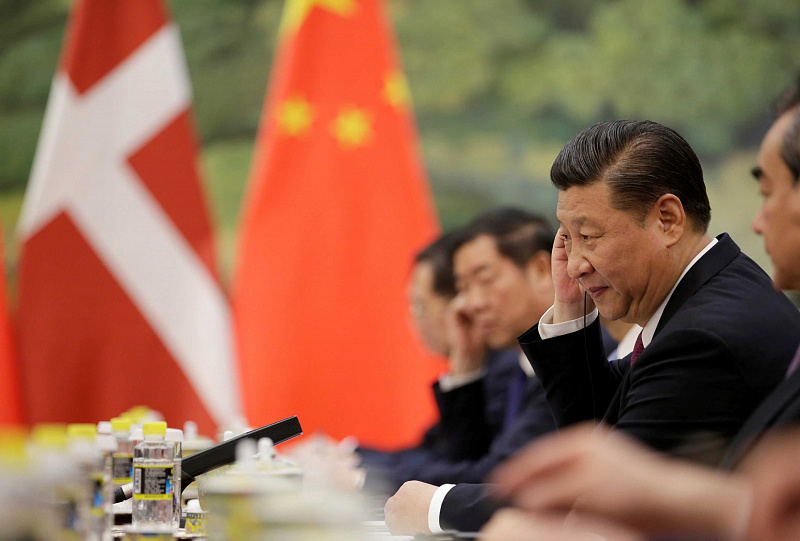Dragon Out in the Cold: A Creeping Securitization of Sino-Danish Scientific Exchanges
In
Log in if you are already registered
In Northern Europe, much as throughout the EU, China is perceived not only as an economic partner but also as a country whose actions entail serious implications for national security. According to the survey conducted by the Norwegian Institute of International Affairs (Nor. Utenrikspolitisk Institutt, NUPI) in 2020 in the five Nordic countries, investments from the EU nations are unsurprisingly perceived—in all the countries except for Iceland—with greater enthusiasm than similar economic overtures from Russia and China, although there is a slightly more negative attitude towards Russian investments than towards those from China.

Source: Reuters
Still, the survey suggests that the disapproval of Chinese investment is particularly high in sectors such as natural resources and infrastructure (43% and 33% respectively) as compared to retail, technology and telecommunications, manufacturing (8%, 19% and 16% respectively). At the same time, the economic dimension of the risks associated with China is not the only area of concern, as China’s presence in the information field attracts as much attention in the Nordic region. For instance, the Swedish Psychological Defense Agency (Sven. Myndighet för Psykologiskt Försvar, MFP) has resumed its work on January 1, 2022, now functioning as a “new” edition of the Office for Psychological Defense (Sven. Styrelsen för Psykologiskt Försvar, SPF), which operated in 1954- 2008. The new agency, however, belongs to the structure of the Swedish Ministry of Justice rather than the Ministry of Defence. Works on the reconstitution of this structure commenced in 2016, and—alongside countering the information threat emanating from Russia, something undisputed for the Swedish authorities—the agency will most likely deal with potential information risks arising from China.
Against this background, Denmark offers a poignant example of how relatively recently in 2020-2021 scientific cooperation with Chinese partners also began to be perceived as a potential source of risks for national security. Jacob Scharf, the former head of the Danish Security and Intelligence Service (Dan. Politiets Efterretningstjeneste, PET) during the period of 2007-2013, in July 2021 in an article for the newspaper Politiken have voiced concerns that Danish universities and research units have become vulnerable to foreign interference, in particular from China, Russia and Iran, which, according to J. Scharf, took full advantage of «the opportunities of globalization and digitalization to carry out espionage» (Dan. «…tage globaliseringens og digitaliseringens nye muligheder for spionage til sig»). J. Scharf sees the main reason for the increased vulnerability of the Danish scientific sphere to foreign influence as stemming from the fact that the PET has been dealing with counter-terrorism issues for a long time while not focusing on or outright ignoring the threat of espionage in Denmark. The former head of the PET also notes that Danish parliamentarians do not hold open public discussions about the threat of foreign espionage, which creates uncertainty in Danish universities and research centers on how to build scientific cooperation with foreign partners in order to counter this kind of risks.
As specific cases of espionage, the article refers to the sentence against 36-year-old chemist Andrey Nikiforov, who was accused of violating article 108, paragraph 1 of the Danish Criminal Code (Dan. Straffeloven), namely cooperation with a foreign intelligence service. Earlier in 2012 Timo Kivimäki, a professor at the University of Copenhagen, was also accused of collaborating with the Russian Foreign Intelligence Service during 2002-2010. In May 2021 it became known that at least 30 Danish scientists (8 of them worked in the wind energy sector) participated in China's 1000 Talents program, which is considered by some to be a veiled attempt at industrial espionage, without notifying their employers. At the moment, an investigation is ongoing into the case of a scientist from Aarhus University, who, without informing the university administration, created 27 research patents for his Chinese partners. As part of the investigation into the participation of Danish scientists in the 1000 Talents Program at the Danish Technical University, one of the researchers voluntarily resigned after it became known that he had not notified the university administration that he had been involved in the creation of a number of Chinese patents. At the Danish Technical University, some scientists have also been collaborating for several years with colleagues from the National University of Defense Technology (NUDT) in the field of dual-use technologies. In 2020 the collaboration of genetic scientists from the University of Copenhagen with the Xinjiang Police College, which is accused of participating in the persecution of the Uyghur population, caught the media’s attention. According to the PET estimates, scientists at Aalborg University in 2015-2016. collaborated with a PhD-student from China, who, as it turned out, published scientific articles in collaboration with an engineer from the PLA Information Engineering University in Zhengzhou, which specializes in the development of electronic intelligence systems. During his time at the university, the postgraduate student gained access to information about the then new «technology for optimizing wireless signals in 5G mobile networks, satellite and radar systems» (Dan. «… avanceret signalteknologi, der kan optimere trådløse signaler i 5G-mobilnetværk, satellit- og radarsystemer») which can be used for both civil and military purposes.
In June 2020 the Politiken newspaper wrote about the participation of two researchers also from Aalborg University in the development of an software algorithm for the Chinese company Hikvision, which develops face recognition, surveillance and monitoring systems also employed in the XUAR. According to one of the scientists, he only later realized that the head of the Hikvision research department was a co-author of a research paper on the algorithm. The administration of Aalborg University, however, denies that research within the university was applied in a patented Chinese algorithm. According to J. Scharf, Danish universities have so far for the most part shown restraint in investigating such cases, showing confidence in their own employees, especially in the absence of concrete evidence. In addition, it also became apparent that Hikvision equipment, which according to the US Department of Defense is partly controlled by the PLA, is also used by the Danish armed forces. Based on this, Minister of Defense Trine Brahmsen requested the Office of Procurement and Technology to conduct an internal investigation into the existence of grounds for excluding Hikvision from supplier list. In December 2021 the PET did not rule out the possibility of the equipment of the Chinese companies Hikvision and Dahua being employed for espionage purposes if it were connected to the Internet. All in all, the number of references to the «Chinese connection» or the «Chinese trail» in the leading Danish media such as Politken and Jyllands-Posten has recently increased significantly, and it has become evident that science could not only be a subject of diplomacy and cooperation, but become exposed to the process of securitization.
The growing threat of espionage in the perception of the Danish intelligence services was also reflected in the fact that in May 2021 the PET even published a special guidance for scientists «Is Your Research in Danger?» (Dan. «Er jeres forskning i fare?») which contains practical advice and recommendations on how to prevent «foreign interference and espionage», which argues that the Danish scientific environment, traditionally characterized by great openness, extensive international cooperation and a high-quality scientific research, is becoming a convenient and attractive target for foreign intelligence services. The increased threat of espionage stemming from China and Russia is also emphasized in the special PET espionage assessment published on January 13, 2022. The Russian ambassador to Denmark Vladimir Barbin considered the publication of this report as merely an attempt at leading the public attention away from the political scandal which is occurring within the Danish Military Intelligence Service (Dan. Forsvarets Efterretningstjeneste, FE). The report explicitly states that the Commonwealth of Denmark, Greenland and the Faroe Islands is particularly vulnerable to possible attempts by Chinese and Russian intelligence services to use controversial issues and topics to create tension among the three constituent parts of the Commonwealth (Dan. Rigsfælleskabet) and in relations with key allies, especially the US. In the assessment PET devotes particular attention to the letter from the Greenlandic Foreign Minister addressed to a US senator, whose name is not mentioned in the assessment, allegedly fabricated and distributed on the Internet by «Russian agents of influence» (Dan. påvirkningsaktører) in November 2019, where Greenland’s authorities stated their intention to hold a referendum on independence from Denmark «as soon as possible» and accepted the American proposal that Greenland should receive «the status of a territory free from any alliances» (Dan. «...status som et organiseret alliancefrit territorium»). The false letter, according to the PET, was aimed at causing ruptures in the bilateral relations between Denmark and the US.
In this uncertain context, the situation with the Winter Olympic Games—while not directly connected with the scientific field—points to the subtle balancing act, something Denmark is trying to achieve in its diplomacy. In the interview with Danmarks Radio on January 14, 2022 Danish Foreign Minister Jeppe Kofod said under increasing pressure from the opposition in the national parliament Folketing that the Danish government would not attend the Winter Olympics in Beijing in February 2022. At the same time, the official announcement of this decision is not presented on the official website of the Danish Ministry of Foreign Affairs, and the Minister himself chose not to use the word "boycott" and did not point to human rights violations as the main reason for Denmark's actions either. The impression was that the current government took this step only under pressure from the opposition and by no means would publicly advertise it as joining the «diplomatic boycott» especially given the recent visit of J. Kofod to China on November 26, 2021 as part of the diplomatic tour in Asia , which has been the first visit of a Danish foreign minister to China in the last 3 years. Denmark, thus, faces the difficulty of reaping economic benefits when cooperating with China and applying unique Danish expertise in climate and green technologies while enhancing the resilience against potential Chinese espionage and «shadowy» practices in the field of scientific cooperation and not giving China unfair advantages in terms of economic competitiveness. Denmark’s actions clearly signal that there is a line to be drawn between being open to scientific exchanges with China and being taken advantage of by Chinese counterparts.
Junior Research Fellow, Department of European Political Studies, IMEMO RAS
Blog: Nikita Belukhin's Blog
Rating: 0




